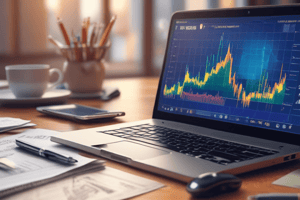Podcast
Questions and Answers
What is a derivative primarily defined as?
What is a derivative primarily defined as?
- An asset that is always traded in cash.
- A contract or product whose value is derived from an underlying asset. (correct)
- A type of security with fixed returns.
- A product whose value is independent of other assets.
Which of the following is NOT a type of underlying asset for derivatives?
Which of the following is NOT a type of underlying asset for derivatives?
- Agri commodities like Wheat and Sugar.
- Energy resources like Oil and Coal.
- Metals like Gold and Silver.
- Equity Options. (correct)
What major event in the 1630s is known for its impact on the derivatives market?
What major event in the 1630s is known for its impact on the derivatives market?
- The selling of wool by English monasteries.
- Tulip Mania, where tulip futures lost value. (correct)
- The establishment of futures markets for rice in Japan.
- The signing of contracts in European trade fairs.
In which century did sellers at European trade fairs begin signing contracts for future deliveries?
In which century did sellers at European trade fairs begin signing contracts for future deliveries?
What was the primary purpose of the futures market developed in Japan near Osaka?
What was the primary purpose of the futures market developed in Japan near Osaka?
What is one of the learning objectives of studying the basics of derivatives?
What is one of the learning objectives of studying the basics of derivatives?
What type of market evolution involved the English Cistercian Monasteries?
What type of market evolution involved the English Cistercian Monasteries?
Which of the following is a significant risk associated with derivatives trading?
Which of the following is a significant risk associated with derivatives trading?
What is the primary role of the Index Committee?
What is the primary role of the Index Committee?
Why is index maintenance necessary?
Why is index maintenance necessary?
What is the purpose of an index fund?
What is the purpose of an index fund?
Which of the following factors triggers an index maintenance issue?
Which of the following factors triggers an index maintenance issue?
How do index derivatives function?
How do index derivatives function?
What is a potential drawback of index funds?
What is a potential drawback of index funds?
Which of the following is NOT a major equity index in India?
Which of the following is NOT a major equity index in India?
What is an example of a continuous exercise related to index management?
What is an example of a continuous exercise related to index management?
What is a key feature of futures contracts?
What is a key feature of futures contracts?
Which of the following is included in the contract specifications of a futures contract?
Which of the following is included in the contract specifications of a futures contract?
What is a limitation of futures contracts?
What is a limitation of futures contracts?
In the context of futures contracts, what does 'contract multiplier' refer to?
In the context of futures contracts, what does 'contract multiplier' refer to?
What determines the quantity in a futures contract?
What determines the quantity in a futures contract?
Which of the following terms refers to the value of the underlying asset in the cash market related to futures contracts?
Which of the following terms refers to the value of the underlying asset in the cash market related to futures contracts?
What is one of the main purposes of a futures contract?
What is one of the main purposes of a futures contract?
What does the term 'MTM settlement' refer to in futures trading?
What does the term 'MTM settlement' refer to in futures trading?
What distinguishes a forward contract from a cash market transaction?
What distinguishes a forward contract from a cash market transaction?
Which statement accurately describes Exchange Traded Funds (ETFs)?
Which statement accurately describes Exchange Traded Funds (ETFs)?
In the context of market risk hedging, which derivative is primarily used?
In the context of market risk hedging, which derivative is primarily used?
What is one disadvantage of ETFs compared to mutual funds?
What is one disadvantage of ETFs compared to mutual funds?
What term refers to the cost that arises due to a lack of liquidity in the market?
What term refers to the cost that arises due to a lack of liquidity in the market?
What does it mean when someone is 'long forward' in a forward contract?
What does it mean when someone is 'long forward' in a forward contract?
Which of the following is NOT a market where forward contracts are widely used?
Which of the following is NOT a market where forward contracts are widely used?
What is the primary advantage of ETFs over traditional mutual funds?
What is the primary advantage of ETFs over traditional mutual funds?
What is the ideal price for a security based on the given bid and offer prices?
What is the ideal price for a security based on the given bid and offer prices?
What is the percentage impact cost when buying 1500 shares based on the calculated prices?
What is the percentage impact cost when buying 1500 shares based on the calculated prices?
What is the primary focus of index construction?
What is the primary focus of index construction?
What does a well-diversified index best reflect?
What does a well-diversified index best reflect?
What causes the variance in impact cost between buying and selling transactions?
What causes the variance in impact cost between buying and selling transactions?
Which of the following statements is correct regarding risk reduction in an index?
Which of the following statements is correct regarding risk reduction in an index?
What is the role of specialized agencies in index management?
What is the role of specialized agencies in index management?
What is a significant factor affecting the ideal price of shares in an infinitely liquid market?
What is a significant factor affecting the ideal price of shares in an infinitely liquid market?
What happens to open interest when a trader closes a long position by selling contracts?
What happens to open interest when a trader closes a long position by selling contracts?
If a futures contract's previous day closing price is Rs.100, what would be the price range for the next trading day if the price band is set at 10%?
If a futures contract's previous day closing price is Rs.100, what would be the price range for the next trading day if the price band is set at 10%?
Which of the following accurately describes a long position in the derivatives market?
Which of the following accurately describes a long position in the derivatives market?
What is the consequence of a trader closing a short position by buying back contracts?
What is the consequence of a trader closing a short position by buying back contracts?
When do price bands for futures contracts get decided?
When do price bands for futures contracts get decided?
Which scenario illustrates an increase in open interest?
Which scenario illustrates an increase in open interest?
What is one of the factors that can justify the expansion of price bands during trading?
What is one of the factors that can justify the expansion of price bands during trading?
What occurs in the derivatives market when a trader goes short in 100 contracts?
What occurs in the derivatives market when a trader goes short in 100 contracts?
Flashcards
Derivative
Derivative
A contract or product whose value is based on another asset (the underlying asset).
Underlying asset
Underlying asset
The asset whose value determines the value of a derivative.
Examples of Underlying Assets
Examples of Underlying Assets
Metals, energy resources, agricultural commodities, and financial assets (like stocks, bonds, and currencies).
Derivatives Market (History)
Derivatives Market (History)
Signup and view all the flashcards
Tulip Mania
Tulip Mania
Signup and view all the flashcards
Futures contract
Futures contract
Signup and view all the flashcards
Early derivative market examples
Early derivative market examples
Signup and view all the flashcards
Significance of derivatives market
Significance of derivatives market
Signup and view all the flashcards
Ideal Price
Ideal Price
Signup and view all the flashcards
Impact Cost
Impact Cost
Signup and view all the flashcards
Impact Cost
Impact Cost
Signup and view all the flashcards
Index Management
Index Management
Signup and view all the flashcards
Index Construction
Index Construction
Signup and view all the flashcards
Index Maintenance
Index Maintenance
Signup and view all the flashcards
Index Revision
Index Revision
Signup and view all the flashcards
Index Diversification
Index Diversification
Signup and view all the flashcards
Index Eligibility Criteria
Index Eligibility Criteria
Signup and view all the flashcards
Index Committee
Index Committee
Signup and view all the flashcards
Index Fund
Index Fund
Signup and view all the flashcards
Index Derivatives
Index Derivatives
Signup and view all the flashcards
Tracking Error
Tracking Error
Signup and view all the flashcards
Futures Contract Feature
Futures Contract Feature
Signup and view all the flashcards
Centralised Trading Platform
Centralised Trading Platform
Signup and view all the flashcards
Price Discovery
Price Discovery
Signup and view all the flashcards
Margin
Margin
Signup and view all the flashcards
Standardized Contract
Standardized Contract
Signup and view all the flashcards
Contract Maturity
Contract Maturity
Signup and view all the flashcards
Contract Multiplier
Contract Multiplier
Signup and view all the flashcards
Underlying Price
Underlying Price
Signup and view all the flashcards
Index Futures
Index Futures
Signup and view all the flashcards
Exchange Traded Funds (ETFs)
Exchange Traded Funds (ETFs)
Signup and view all the flashcards
Cash Market
Cash Market
Signup and view all the flashcards
Forward Contract
Forward Contract
Signup and view all the flashcards
Spot Price
Spot Price
Signup and view all the flashcards
Forward Price
Forward Price
Signup and view all the flashcards
Long Forward
Long Forward
Signup and view all the flashcards
Open Interest
Open Interest
Signup and view all the flashcards
Traded Volume
Traded Volume
Signup and view all the flashcards
What is the relationship between Open Interest and Traded Volume?
What is the relationship between Open Interest and Traded Volume?
Signup and view all the flashcards
Price Band
Price Band
Signup and view all the flashcards
How is Price Band Calculated?
How is Price Band Calculated?
Signup and view all the flashcards
Long Position
Long Position
Signup and view all the flashcards
Short Position
Short Position
Signup and view all the flashcards
What are some key terms commonly used in derivatives markets?
What are some key terms commonly used in derivatives markets?
Signup and view all the flashcards
Study Notes
NISM Series VIII: Equity Derivatives
- This workbook is designed to prepare candidates for the NISM Series VIII: Equity Derivatives Certification Examination.
- The workbook version is September 2024.
- It is published by the National Institute of Securities Markets (NISM).
- NISM's address is 5th Floor, NCL Co-operative Society, Plot No. C-6 E-Block, Bandra Kurla Complex, Bandra East, Mumbai – 400 051, India.
- NISM's website is www.nism.ac.in
- The publication is for use by candidates taking the NISM Series VIII: Equity Derivatives Certification Examination on or after November 29, 2024.
Foreword
- NISM provides high-end professional education, certifications, and research in financial markets.
- NISM engages in capacity building among stakeholders in the securities markets.
- NISM certification programs aim to enhance the quality and standards of professionals in the financial sector.
Disclaimer
- The contents of the publication do not necessarily constitute an endorsement or recommendation by NISM or SEBI.
- The publication is for general reading and educational use only.
- NISM and SEBI do not assume any responsibility for any actions taken based on the information provided in the publication.
- Readers should consult professional advice before taking any action based on the information in the publication.
Acknowledgement
- The workbook was developed jointly by the NISM Certification Team and Dr. Aparna Bhat.
- NISM acknowledges the contribution of the Examination Committee, consisting of representatives from stock exchanges and industry experts.
Examination Objectives
- Candidates should understand the basics of the Indian equity derivatives market.
- Candidates should understand various trading strategies utilizing futures and options on stocks and indexes.
- Candidates should understand clearing, settlement, and risk management in equity derivatives markets.
- Candidates should have knowledge of the regulatory environment in which the equity derivatives markets operate in India.
Assessment Structure
- The NISM Series VIII: Equity Derivatives Certification Examination consists of 100 multiple choice questions.
- The examination duration is 2 hours.
- There is a negative marking of 25% for each incorrect answer.
- The passing score is 60%.
How to Register and Take the Examination
- Visit www.nism.ac.in to register and find more details about the examination.
Important Information
- The examination workstations are equipped with Microsoft Excel or OpenOffice Calc.
- Sample questions and caselets are for reference and the difficulty level may vary in the actual examination.
Contents (Outline of Chapters)
- (The following list details the topics covered in the workbook, with page numbers.) Includes sections on Derivatives, Understanding Index, Forwards and Futures, Introduction to Options and various strategies, Trading Mechanism, Legal and Regulatory Environment, Accounting and Taxation, Sales Practices and Investor Protection Services etc.
Studying That Suits You
Use AI to generate personalized quizzes and flashcards to suit your learning preferences.




